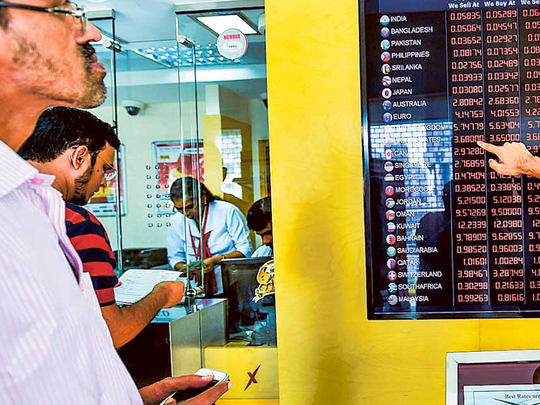
Dubai: Industry experts have urged a wait and watch approach for currency remitters and traders even as high volatility is expected with the European Union officials waiting for proposals from Greece.
The Greek government is working to pull together an economic package to convince European leaders that it can stay in the euro area. Prime Minister Alexis Tsipras will present EU officials with a plan that includes spending cuts, in exchange for a new European bailout.
The leaders of all 28 European Union countries will meet in Brussels on Sunday to decide their response to Greece’s proposals. The ECB said Wednesday it will meet on Monday to consider its own next moves.
The new developments have put the euro on back foot. The currency has shed almost a fifth of its value since 2011, before hitting a five week low of $1.0916 earlier in the week.
“If this Greece situation is going to last longer, and if the euro goes below parity with the dollar, then they need to play a wait and watch game. For people who want to send corporate remittances, it can be a wait and watch game,” Sudhesh Giriyan, chief operating officer, Xpress Money Services Ltd said by phone.
About 10-12 million euros get remitted from the UAE on a daily basis, which mostly includes corporate remittances.
Ashwin Shetty, vice-president treasury at UAE Exchange also agreed on the wait and watch approach, but at the operational level said they were hedged to avoid any volatility.
“If they want to remitt then they can wait. Margins are very less in euro, so we play very safe. Even if the currency is volatile, our currencies are hedged properly, so one way we sell, and the other way we buy,” Shetty said.
Another executive at one of the money remittance provider said the strategy is to play safe in euro.
“We are playing safe in euro. We don’t have any outstanding positions in the euro as of now. We will look and see for next week, and do trades on limited basis. The euro has become the most volatile currency apart from the British pound, so the risk is so high that you can be a millionaire or a pauper in a few seconds,” an executive at UAE-based exchanges, who did not wish to be named as he was not authorised to speak to the media.
Not a big market
Greece is not a very big market as far as outbound remittances are concerned. In Europe, France, UK, Germany, Spain, Italy are top remittance countries. Greece is not counted in the top countries as far as remittances are concerned. So to that extent, the impact is minimal, Giriyan said, adding, “Eurozone countries are send markets for us. There is not so much of inbound business for us in the Eurozone.”
But analysts expect a further crash in the euro due to the current standoff.
“People are contemplating that the euro would crash, and may go down to the level of 1.05 to the dollar. There is no reason that euro should get into parity with the US dollar in coming sessions,” Giriyan said.
“From our overall business perspective, there is not much of an exposure. Majority of our agents fund is in US dollars, and our funding with payout partners, so be it India, Pakistan is in USD, so to that extent our exposure is minimal. Since euro is not our settlement currency, we need not be unnecessarily alarmed, he added.
Limited depreciation in the rupee
The non-resident Indians, who make the largest chunk of remittances from this part of the world, can wait for further depreciation to take advantage.
“The rupee would be playing in the same band, and still it could still depreciate by another rupee or so. If somebody has high disposable income and can afford to wait, and somebody who is sending a huge amount of money, and will get 75 paise or 1 rupee more, then why not?,” said Giriyan.
The Indian rupee has been hovering in the range of 60-64 to a dollar since 2014. The rupee hit a record low of 68.85 rupees to a dollar in 2013.
“The rupee is still hovering in the range of 63-64 rupees to a dollar. I have my own doubts if rupee would touch the level of 65,” Giriyan added.
Leading
The World Bank has said India continues to be the leading nation in remittances, pulling in $70 billion (Dh256.9 billion) from its global migrant workforce in 2014.
The World Bank’s study on remittance, the money workers and professionals working in foreign lands send back to their native countries, attributed this mainly to weak economic growth in Europe, deterioration of the Russian economy and the depreciation of the euro and rouble.
Remittances to the developing world are expected to reach $440 billion (Dh1.6 trillion) in 2015, an increase of 0.9 per cent over the previous year. Global remittances, including those to high income countries, are projected to grow by 0.4 per cent to $586 billion.
United States, Saudi Arabia, Germany, Russia and the UAE remained the top five migrant destination countries and apart from India, China, Philippines, Mexico and Nigeria are the top five remittance recipient countries, in terms of value of remittances, the report said.












